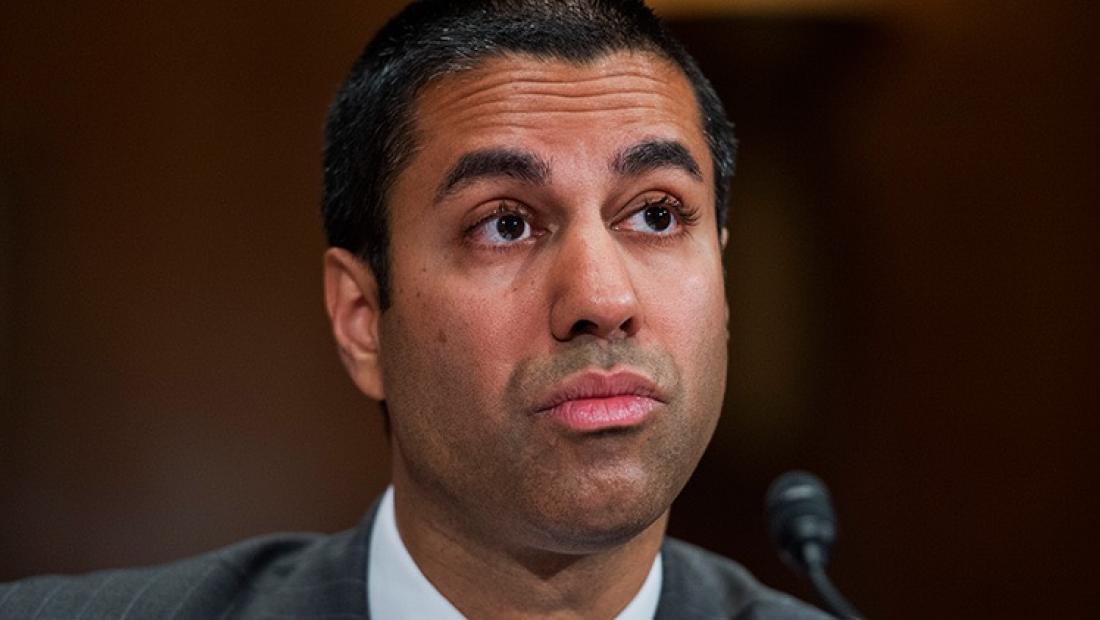Pai Opposes Any Government-Issue 5G Net

The smarter way to stay on top of broadcasting and cable industry. Sign up below
You are now subscribed
Your newsletter sign-up was successful
The Trump Administration is pondering creating its own 5G network using midband spectrum, according to a report from Axios, which says the plan is to nationalize a portion of the nation's wireless network.
According to the website, there is a National Security Coucil memo that proposes government control of a 5G midband network to protect against "China and other bad actors." One source familiar with the proposal said it had been floated by a couple of major computer company/edge players who stood to benefit and was a non-starter, though in the current political climate and the invocation of cybersecurity, nothing would appear to be completely off the table.
Rep. Greg Walden (R-Ore.) said during the State of the Net conference in Washington Monday that when he learned about the memo, he said he did not think the government-run net was a good idea, while acknowledging their needed to be a government partnership.
Former Commissioner Robert McDowell, who was interviewing Walden, referred to reports that the White House had since signaled it was not planning to nationalize 5G.
White House Press Secretary Sarah Sanders, responding to a question about the memo at the daily White House briefing, did not dismiss the idea out of hand. She said no decisions had been made about how to have a secure 5G network, that they were in the early stages of discussion, that there were a lot of things on the table, but also that there was clearly a need for such a secure network.
Had there been some "there" there, the President's FCC chairman and the rest of the Republican majority were definitely not on board.
“I oppose any proposal for the federal government to build and operate a nationwide 5G network," Pai said in a statement. "The main lesson to draw from the wireless sector’s development over the past three decades—including American leadership in 4G—is that the market, not government, is best positioned to drive innovation and investment."
But he did say government should have a roll in 5G. "What government can and should do is to push spectrum into the commercial marketplace and set rules that encourage the private sector to develop and deploy next-generation infrastructure. Any federal effort to construct a nationalized 5G network would be a costly and counterproductive distraction from the policies we need to help the United States win the 5G future.”
The smarter way to stay on top of broadcasting and cable industry. Sign up below
Related: White House: Secure 5G is National Priority
The wireless industry agrees.
“The wireless industry agrees that winning the race to 5G is a national priority," said CTIA President Meredith Attwell Baker, but she signaled industry should be the one driving that train: "The government should pursue the free market policies that enabled the U.S. wireless industry to win the race to 4G.”
Republican FCC Commissioner Michael O'Rielly was quick to put a pin in what he called a lead balloon.
“I’ve seen lead balloons tried in D.C. before but this is like a balloon made out of a Ford Pinto," said O'Rielly. "If accurate, the Axios story suggests options that may be under consideration by the Administration that are nonsensical and do not recognize the current marketplace. Instead, U.S. commercial wireless companies are the envy of the world and are already rushing ahead to lead in 5G. I plan to do everything in my power to provide the necessary resources, including allocating additional spectrum and preempting barriers to deployment, to allow this private sector success to continue.”
Republican Commissioner Brendan Carr made it unanimous: "Any suggestion that the federal government should build and operate a nationwide 5G network is a non-starter," he said. "We will lead in 5G by reducing regulation and freeing up the private sector to invest and deploy next-generation networks. That is why we are already taking steps to ensure that our regulatory frameworks are 5G Ready."
Democratic FCC Commissioner Mignon Clyburn was not high on a federal government-run network either. "“The United States’ leadership in the deployment of 5G is critical and must be done right," said Democratic Commissioner Mignon Clyburn. "Localities have a central role to play; the technical expertise possessed by industry should be utilized; and cybersecurity must be a core consideration. A network built by the federal government, I fear, does not leverage the best approach needed for our nation to win the 5G race.”
“There is nothing that would slam the breaks more quickly on our hard-won momentum to be the leader in the global race for 5G network deployment more quickly than the federal government stepping-in to build those networks," said USTelecom President Jonathan Spalter. "The best way to future-proof the nation’s communications networks is to continue to encourage and incentivize America’s broadband companies -- working hand-in-glove with the rest of the internet ecosystem, and in partnership with government, to continue do what we do best: invest, innovate, and lead.”
At the State of the Net conference Monday in Washington, National Telecommunications & Imformation Association head David Redl, the president's principal telecom advisor, pointed out that the President last year made it clear that the security of 5G networks was a national security priority. He did not address the report of the memo.
The President is expected to talk about infrastructure needs in his State of the Union speech Jan. 30.
Contributing editor John Eggerton has been an editor and/or writer on media regulation, legislation and policy for over four decades, including covering the FCC, FTC, Congress, the major media trade associations, and the federal courts. In addition to Multichannel News and Broadcasting + Cable, his work has appeared in Radio World, TV Technology, TV Fax, This Week in Consumer Electronics, Variety and the Encyclopedia Britannica.

